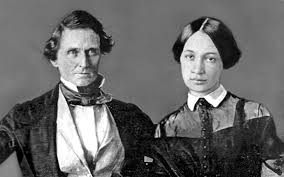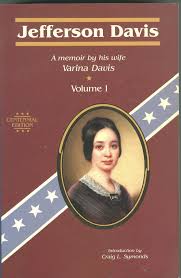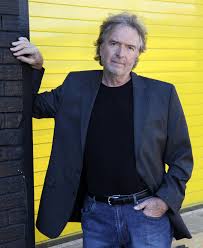Genre: fiction and biography.

GoodReads meta-data is 368 pages, rated 3.7 by 4,857 litizens.
This book is a novel about the life and times of Varina Howell (1826–1906). Who? Varina Davis. Huh? Mrs Jefferson Davis. If it is still a ‘Huh’ go back to Angry Birds on the Smartphone. I read it as a biography of this First Lady. First Lady? Read on.
As a girl Varina was too tall, too serious, too dark, too talkative, too well read, too interested in the wider world, too big, too judgemental, too…. At seventeen her family was only too glad to see her wed Jefferson Davis, more than twice her age.

Jefferson came with baggage. He had married for love years before. It was a match not sanctioned by either family and the couple eloped. She was the daughter of a future president, Zachery Taylor. It was the time of the anti-vaxxers. On the honeymoon she died. Jefferson went into mourning and stayed there for seven years. N.B. Her parents did not want her to marry a soldier as Davis then was, not that there was any objection to him personally. They did not blame him for her death.
His family was an older brother, Joseph, who by primogeniture owned and ruled the family plantation with a whip in hand. The much younger brother, Jefferson, had nothing but the sufferance of Joseph. There was little of that. To get Jefferson out of the way, Joseph gave him a property to manage, but he retained ownership.
He pushed Jeff into the army to get him out from underfoot, and later pushed him into politics for the same reason. He disapproved of the first marriage because he wanted a dowry out of it, and when the couple eloped there was no dowry. The later marriage to Varina was arranged to suit Joe. Jeff had been moping around for seven years after his first wife’s death. In this telling Joe simply wanted to get Jeff settled. Not that he felt sorry for him, more annoyed with his constant gloom.
Old Joe had met Robert Owen, when the latter was on a tour in the United States, and Joe tried to realise some of Owen’s philosophy on his planation, adapting it to the slavery that — in Old Joe’s terms — united capital and labour. His descriptions of this arrangement are ridiculous but have the sort of inner logic that appeals to an autodidact. He had the words but not the substance of Owen’s practice per New Lanark, which we have visited.
Davis served first in the Black Hawk War in which few shots were fired in anger (where he may have crossed paths with Abraham Lincoln) and then in the Mexican War with distinction, and traded on that record to enter politics, pushed at every step by Old Joe. He become a Senator and then Secretary of War. He and Varina lived for years in Washington on the D.C. and no doubt he had a case of Potomac Fever. She liked the life there, entertaining and being entertained. The soupçon of Europe ambassadors brought. The access to northern merchandise unknown in Mississippi. The aura of history made and in the making. All of this appealed to this very young woman.
In ‘Varina’ there are several accounts of close personal relationships between owners and slaves. These are very nicely done. Jefferson had a body slave named Pemberton who went with him everywhere and who came to run the planation in all but name. They drank from the same cup; talked each morning and evening of the work. Yet occasionally when Jefferson was irritated a sting came into his voice, and Pemberton went quiet. Master and Slave were well aware of each other’s place.
In another instance there was a young women who grew up with a slave companion. They gossiped together; giggled together; picked out clothes together. They were like sisters, but not quite. Then one day when the white woman needed money she sold the slave’s ten year old child for the money to buy a new dress. The slave woman was heartbroken. When she wailed and cried, she was beaten…into submission.
Getting back to the book at hand, the story is told in flashback. Varina is interviewed long after the war. Much of her story concerned April 1865 and after. The evacuation of Richmond and the long flight south toward the El Dorado of Havana. In the course of this flight she observed the ruination visited on the Carolinas, and Georgia.
More often then than not doctors prescribed morphine for women, and Varina mixed hers with red wine, a lot. Doped up and docile seems to have been one goal. The name ‘Varina’ is a variant from the Greek for Barbara, referring to those who do not speak Greek.
Toward the end of her time, she edited and finished the memoirs that Jefferson could not complete. This seems an act of financial necessity in these pages and nothing more. The memoirs were an asset to be realised in difficult times.

There are vivid descriptions time of life along the Mississippi, sometimes easy going and at other times deadly.
It starts slowly and is written in the present tense. This latter is enough to put me off but one night for the lack of an obvious alternative on the Kindle I persevered, and it got more interesting and the present tense faded. Equally irritating is the absence of conventional punctuation, like quotation marks to set off and identify statements by the characters. Grrr!
After reading much about Jefferson Davis I wondered how anyone, wife included, could put up with him – pompous, prickly, proud, and worse. In both Allen Tate’s ‘Jefferson Davis: His Rise and His Fall’ (1929) reviewed elsewhere on this blog and Eli Evans’s ‘Judah Benjamin: The Jewish Confederate’ (1988), reviewed elsewhere on this blog, Variana figures as a player in the tragedy of the Confederacy.
Benjamin was one of the very few Richmond politicians who got along with Davis and he did so in good part by working with and through Varina, but none of that figures in this account, which is weighted to her life before and after the Confederacy, not during. That is too bad because my impression is that she exercised a moderating influence on the generally intractable Davis.
Which parts of the story are fact and which are fiction? I cannot say but the author seems scrupulous and includes a short bibliography.
 Charles Frazier
Charles Frazier
Side Bar: Fanny Wright likewise tried to apply Owen at Nashoba Community in the 1820s Tennessee. Her aim was to teach slaves to earn their freedom through work so that emancipation would come at no cost to owners. While the rhetoric was high, the reality was not. I visited the locale in Memphis and did some library work on this community in Nashville a time ago. It was celebrity vanity at work.
Skip to content
